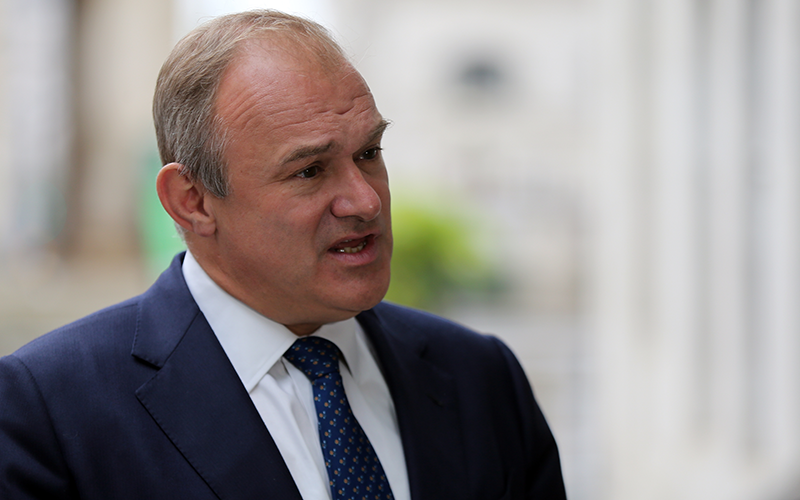
Lib Dem leader Ed Davey. Image © STIs/Shutterstock
A radical overhaul of scrutiny and governance has been demanded in response to the Post Office scandal.
Sir Ed Davey, now leader of the Liberal Democrats, plus experts in audit and governance have called for a new legal duty of candour to be placed on boards and organisation leaders in the public sector.
They have warned the current oversight processes have been shown to be inadequate after a series of failures involving private sector firms and public sector projects.
And the government has been urged to consider revisiting the Nolan code of standards for people in public life.
Sir Ed Davey was post minister in 2010 – and first to meet Alan Bates while he was in the role.
He backed calls for a new legal duty of candour for organisations involved in public sector contracts, saying the response by the Post Office to multiple ministers and the postmasters – despite knowing the Horizon IT project had failings – had brought the public scrutiny system into disrepute.
Sir Ed told PF: “We have a broken system that puts major institutions like the Post Office at ‘arms length’ from our elected representatives, and makes them almost a law unto themselves. Close enough for rubber stamping, yet out of reach of proper scrutiny.”
The comments came as the row between business secretary Kemi Badenoch and the Post Office’s former chair Henry Staunton continues raising questions about governance at the government-owned firm.
The Horizon IT scandal is the biggest to hit the public sector and caused “an affront to justice” with hundreds of innocent people jailed and a potential bill of £1.2bn. But it is not the only public scandal that is going to cost hundreds of millions of pounds.
Campaigners and a public inquiry, as well as a police investigation, are probing the PPE contracts awarded during Covid-19 lockdowns.
A four-day testimony event in London failed to get answers from representatives of organisations with responsibility for the Grenfell Tower where a fire killed 72 people.
A campaigner fighting for justice for victims of the blaze is also demanding change.
Sandra Ruiz, whose niece died, told PF that a radical overhaul of procurement and public standards legislation has to come. “What drives decision-making is cost and time schedules,” she added.
“Lawmakers need to have personal accountability. Yes, the corporates need to be given new processes and procedures. But the government should be holding themselves to an even higher standard.”
And there have been other failures linked to governance concerns. Last year, two local authorities issued S114 notices due to poor investment decisions that have left costs running into hundreds of millions of pounds.
Ed Hammond, deputy chief executive at the Centre for Governance and Scrutiny, said part of the problem is that governance rules are focused on preventing personal gain rather than organisational failure.
During the Horizon IT failures, a succession of ministers were advised they would be interfering with criminal cases despite the fact that the Post Office knew the evidence that the prosecutions were based on was flawed.
Hammond told PF: “There are other recent examples in local government and the public sector. It’s a multi-faceted problem and part of something bigger: what happens when professionals fail in their duty.”
He added: “We are reliant on people acting in good faith. We have a system based around preventing personal gain - corruption. This is a broader, systemic problem.”
CIPFA, one of the public sector’s lead organisation on scrutiny and oversight, is also determined to see change.
Iain Murray, CIPFA’s director of public financial management, said organisational culture must be at the cornerstone of effective governance.
Politicians criticising bureaucracy and ‘red tape’ would leave organisations open to the risk of serious failure.
“Strong accountability also includes effective scrutiny and oversight at the point of decision-making and, more importantly, throughout the life of a project or scheme,” he said.
“Some see this as an unnecessary box-ticking exercise and inefficient red tape, but the flipside remains. Being complacent about how you set out to scrutinise and make decisions is a guaranteed route to failure.
“At the heart of these failures is not that something went wrong but a lack of transparency and unwillingness to acknowledge failures and act appropriately on them. This is how bad situations get worse.”
Hammond said the government response could start with revisiting the official code on standards.
He said: “We can go back to the standards in public life. Is it time to have a systemic review and revisit the Nolan principles? How do we enforce them and make them stick?”
“It is also about being proportionate – not people being sanctioned all the time; you can’t work in a space where there is no trust.”
Ministers were urged not to wait for the Post Office inquiry to end.
Sir Ed Davey said the postmasters deserved more than a pay-out: “We owe it to the victims of this appalling scandal not just to overturn their convictions and pay fair compensation – though do that we must – but also to prevent anything like it from ever happening again. That means fixing the big systemic issues like this, that cause so much injustice in the first place and then delay justice for so long.”
Read our full story on the Post Office in the March edition of Public Finance.











